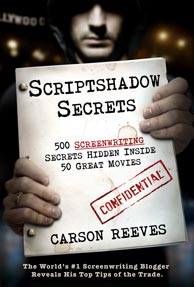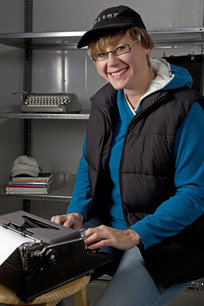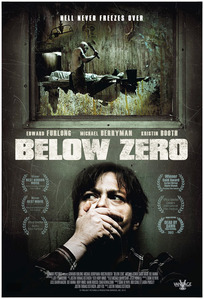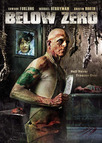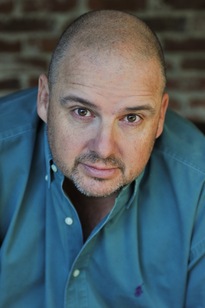
GAPF is delighted
to have screenwriter, Doug Richardson, chatting it up with Jeanne Veillette
Bowerman at this year’s GAPF, Saturday, June 2nd at 4:30pm.
Richardson
attended USC’s School of Cinema. After finishing college, Doug signed a two-year
contract with Warner Brothers. In 1989 he garnered national attention when his
spec screenplay was the first in Hollywood to sell for a million dollars. Doug’s
first feature film, the sequel to DIE HARD, DIE HARDER, was produced in 1990. He
has since written and produced feature films including the box office smash BAD
BOYS and HOSTAGE. To date, Doug’s features have grossed over 800 million dollars
worldwide. Doug is crafting his fourth novel and writes a weekly blog sharing
his screenwriter war stories - dougrichardson.com.
Get a taste for
the chat in Jeanne Veillette Bowerman’s Script Mag Balls of Steel article,
Take Your Label and Shove It.
_______________________________________________
Our nature is to define people with labels,
even writers. For some reason, it makes us more comfortable to slap a tag on
someone in permanent ink, marking them a thriller writer, a rom-com writer, a
novelist, or a screenwriter.
I’ve always loathed labels. It’s why I never
joined a sorority. Plus, they wanted me to pay dues for the privilege of being
pigeonholed. Funk that.
At Cornell, we called a non-Greek student a
GDI … God Damn Independent.
I met Richardson via friend and
best-selling thriller author,  JT
Ellison.
JT
Ellison.
Yes, I just labeled Ellison. See how that
works?
The first thing I do upon meeting a person
online is stalk his or her website. That’s where a writer’s skeletons hide. I
clicked  Richardson’s
site. Wait, he’s an action writer? No, he’s not. He’s a
novelist, he’s a screenwriter, he’s a blogger, oh my – I think I just saw
Superman fly by.
Richardson’s
site. Wait, he’s an action writer? No, he’s not. He’s a
novelist, he’s a screenwriter, he’s a blogger, oh my – I think I just saw
Superman fly by.
On Richardson’s  blog, he shares war
stories from his decades as a professional screenwriter. He calls the tales
“catnip for movie writers.” And they are. You’ll soon be addicted, clawing at
your computer screen, begging for more.
blog, he shares war
stories from his decades as a professional screenwriter. He calls the tales
“catnip for movie writers.” And they are. You’ll soon be addicted, clawing at
your computer screen, begging for more.
“I write what I would have wanted to read
when I was starting out. I always want to know how stuff went down. I’m
fascinated by process, and I want to know how it happened or how it worked
out.”
While his blog is full of very cool
behind-the-scenes stories, his new novel,  The Safety
Expert, really sparked my interest. I downloaded the first
chapter tease and was hooked.
The Safety
Expert, really sparked my interest. I downloaded the first
chapter tease and was hooked.
There is so much more to this writer than
car chases, gunfights, and edge-of-the-seat action. He is the real-life example
of what I preach in this column – gutsy writing.
He doesn’t just write, he writes with
fireballs.
Recently, I asked him what it’s like living
with the action-writer label. He shared a story similar to the ones he tells in
his blog:
“Years ago, Gary Ross and his wife,
Alison Thomas, had a fun scrabble tournament called Quetzal Cup. There was this
god-awful trophy for the winner. It started off as kind of a joke. Gary invited
all these high-test writers, executives, and agents. Since this business is so
damn competitive, it attracts type-A people, so within a couple of years, the
tourney became fierce with over a hundred players. In the third year, I won it.
There was a sense in the room that something had gone terribly wrong. So, when I
gave my silly little acceptance speech, I said, ‘I know you guys think I’m an
action writer and can only write in two-syllable words, but apparently I know
high value two-syllable words and beat your asses.’”
The success of his first novel,  Dark Horse,
ripped his action-screenwriter label off.
Dark Horse,
ripped his action-screenwriter label off.
“Avon/Morrow asked me to give them a list
for advance copies. I sent hardcovers to producers and agents all over town.
They were thrilled and couldn’t believe I got published. It changed people’s
perception of me. Suddenly I was able to get in the room to pitch and sell
stories that, prior to the book, wouldn’t have stood a
chance.”
Novels and movies are on opposite ends of
the spectrum. In film, you have a director of photography, actors, costume
designers, etc. to aid your story … and to please. But in a novel, the writer is
all of those things. All you have to please is your editor and the publisher.
And in the new world of self-published e-books, you just need to please your
audience.
Writing novels secures Richardson’s
sanity.
“It makes writing screenplays that much
more fun, because I can stomach the down side of collaborating and the specter
of  lousy notes. I
don’t have to be as precious when I know, at the end of the screenplay, I can
crawl back to my cave and pump out a novel in solitude. Carve something in
stone. Once I’ve got it my way, the rest is easy, even my own adaptations. Like
my second book,
lousy notes. I
don’t have to be as precious when I know, at the end of the screenplay, I can
crawl back to my cave and pump out a novel in solitude. Carve something in
stone. Once I’ve got it my way, the rest is easy, even my own adaptations. Like
my second book,  True Believers.
I don’t think anyone was more merciless as a writer in adapting to film than I
was. I was thrilled to take it further away from my book. Writing it as a movie
was like reinventing it.”
True Believers.
I don’t think anyone was more merciless as a writer in adapting to film than I
was. I was thrilled to take it further away from my book. Writing it as a movie
was like reinventing it.”
Balancing both the life of an independent
novelist and a collaborative screenwriter requires great
discipline.
Traditional book publishers want at least
one book on the shelves a year. That’s tough to maintain when you have scripts
in development.
“I always planned to do both. When I
wrote my first novel, I got a lot of lip service from my film agency, but no
real support. At the time, I had taken the job of being the last writer on
Bad Boys to make a paycheck in order
to have the time to write the novel. Then, once I’d finished the novel and
needed to get out and find a publisher, Bad Boys had come out and was a
big hit. The agents were frustrated I wasn’t capitalizing on the film’s success
with big-dollar rewrites. They wanted me to take more screenwriting gigs, not
get published and write another novel. When your stock is up in screenwriting,
it’s crazy money. So to pass that up, is not what my agents wanted to
hear.”
But Richardson stood firm.
And when he caught his film agents allegedly
trying to sabotage the book getting published, he did what any ballsy writer
would do – he fired them.
“After I wrote the second book, I found
it hard getting to the third because I had two kids in private school, a
mortgage to pay, and producers teeing up assignments in front of me, along with
money. In hindsight, I think I erred. A novelist should have a book out at
least every 18 months to build up readership. I stalled, and when my literary
agent would call about the next book, I’d rationalize that after the adaptation
of True Believers came out as a movie, it would jack book sales, and I’d
write the next book after that.”
That particular movie didn’t work out. But
luckily, fate has a way of leading us down the right path.
“The publishing world as it was then has
not been as good to mid-list and genre writers as the e-publishing world has
become. Quite possibly, had I been writing for my traditional publisher during
that period, it could have proven more frustrating as they continued to tighten
their belts and deal with their own shrinking business. Being a writer inside a
shrinking house is not fun. Now I don’t have to worry about what that
house thinks because I’m e-publishing.”
In the last two years, I’ve seen more and
more writers let go of the dream of seeing their book on the shelves of Barnes
and Noble and embrace an instant download to their readers’ tablets or
computers.
“It was a tough decision to e-publish. No
question, it’s a great kick to see your name on something, whether it’s on a
movie screen or a book displayed in a bookstore. At the same time, there are so
many fewer Barnes and Nobles to see your book displayed at. I’m going to miss
seeing my books in a bookstore, but in a few years I hope to see them in a big
pile at Costco.”
Surviving this industry for decades isn’t an
easy task. As I listened to Richardson speak, I soaked in his
advice.
“There are a lot more successful
relentless people in Hollywood than there are successful talented people. You
need to water and fertilize the grinder side of you as much as your creative
side. Grow it. Turn yourself into a grinder because relentless will win over
talented every time.”
As an unproduced, scrapper of a screenwriter
myself, I wondered what it felt like to successfully climb the ladder and
finally break in.
“Every movie is a mountain. Once you
climb to the top, you see all the other mountains you want to
climb.”
It was at his first official WGA meeting he
realized writing novels would be another mountain he was destined to
conquer.
“Writers can get really bitter. I heard
all these old guys complaining about getting screwed over by studios and
directors. My notion was that making movies was a collaborative process that
lent itself to emotional scarring. And to avoid that, I’d have to write books to
keep my sanity.”
Richardson has done just that and suggests
other screenwriters keep an open mind when choosing a path for their
careers.
“Wannabe screenwriters dream of having
that one ‘magic script’ that garners them attention. They want to define
themselves by saying, ‘I’m a writer’ or ‘I wrote that.’ But there’s an enormous
difference between ‘I’ve written’ and saying ‘I’m a writer.’ A true
writer wants to write one project, then another, and another. A writer needs to
be writing … needs to write. Be a writer. Don’t limit yourself by
a label.”
So what label does Richardson put on
himself?
“When people ask me what I am, I simply
answer, ‘I’m a writer.’ I can’t say what kind. Everything I write — whether a
blog post, a novel, or a script — is a form of expression, and I enjoy them all
very much. I write because I need to.”
Doug Richardson’s new book  The Safety
Expert is out. Head on over to his blog and instantly grab
yourself a copy. I guarantee you’ll be satisfied.
The Safety
Expert is out. Head on over to his blog and instantly grab
yourself a copy. I guarantee you’ll be satisfied.
